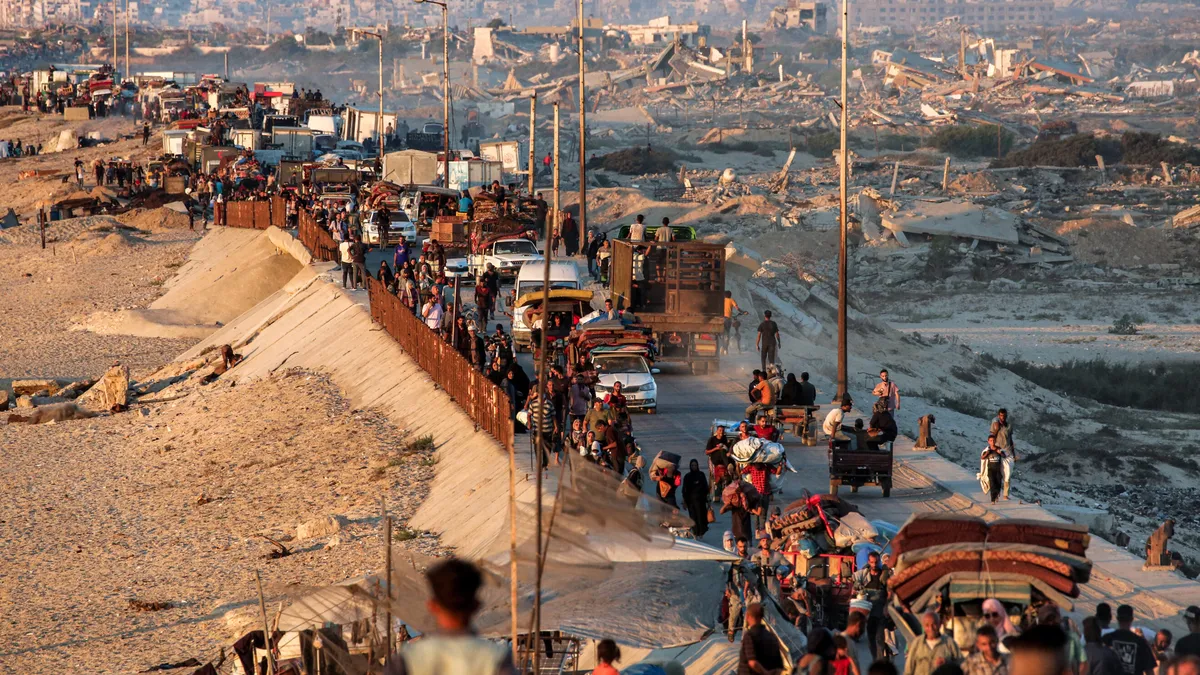
On a recent video call, Bahara’s face flickered in and out — her sharp cheekbones barely visible in the dark. The power was out again in Kabul.
The 19-year-old spoke for a few minutes with her family in Illinois before the screen went black and an eerie quiet settled over the room.
It has been four years since Bahara’s family of seven was together, and since they last saw their youngest daughter. In their living room, half a world away from her, they relive their separation from her.
“We are very, very worried all the time,” her father said, curled up on the floor, weeping. “We always think about her.” The Tribune has withheld Bahara’s parents’ names for security reasons.
In August 2021, shortly after American troops withdrew from Afghanistan and as the Taliban advanced on Kabul, Bahara’s family joined thousands of others racing to the airport.
For nearly 20 years, Bahara’s father served as a security guard providing protection for U.S. military personnel and now feared retribution from the Afghan government. He and his wife had never considered leaving their country, but one of their sons had already been shot in the leg by the Taliban and they felt a need to protect the family.
But at the airport, a flash bomb exploded in the crowd. Bahara’s mother was hit in the face and began bleeding badly. Petite Bahara, then 15 years old, was swept away in the chaos.
Bahara’s father tried to return to the blast site to find her, but U.S. soldiers stopped him, telling him they would locate her and reunite the family.
Bahara’s sister Setara, who is three years older, lost her shoes in the panic. She traveled barefoot on the cargo plane, squeezed among hundreds of people, barely noticing her lack of footwear. She was consumed with worry — for her mother’s condition, and for Bahara.
Upon arriving in Germany, before going to the U.S., Setara faintly recalls someone handing her a pair of used shoes.
A fractured family
The rest of Bahara’s family made it to the U.S. under the Department of Homeland Security’s Operation Allies Welcome program, which resettled more than 88,000 Afghans after the Taliban takeover in 2021.
The family’s separation from each other didn’t end with Bahara. The oldest son was resettled in Washington state. Though he’s stable — married, employed and able to provide for his own family — the distance has still been painful during such a fragile time. His mother has never met her own grandchildren.
The remaining five spent half a year at a military camp in New Jersey before being relocated to Illinois, where they were told there was a large immigrant population. They lived at a hotel in the suburbs for several more months before moving to a quiet, tree-lined street outside Chicago.
Bahara’s immigration process stalled for different reasons, including a lack of knowledge of the steps required and because the family lost all their documentation during the airport explosion. But it was moving forward slowly under the Biden administration.
Then, in the months since Trump took office, progress on her case has seemingly stopped altogether.
Amid the family’s grief, Setara, 22, has had to take on more responsibility. She brings her mother to rehabilitation appointments, cooks and works at a nearby fast-food restaurant.
She tells Bahara on the phone about her new life in the U.S. — the little freedoms, like walking at night. But her guilt is constant. It keeps her inside, pulling her away from school and friends.
“I can’t help but think, ‘If Bahara were here, she would love this,’” Setara said. “All of it.”
It doesn’t feel right to carry on without her, she said. She prefers to stay inside their apartment alone.
Setara wants to help teach her sister English, but frequent power outages mixed with her jammed schedule make it hard logistically for the two sisters to communicate. When they can connect, she said they like to focus on old memories, the 15 years they did spend together.
She has video-called Bahara to show her the park nearby and the Lake Michigan beach.
“I tell her that one day she’ll come here,” she said. “It’s OK if it takes five years or more.”
Life under Taliban rule
Since it came to power in 2021, the Taliban has ruled Afghanistan by decree, dismantling democratic institutions and replacing them with a strict version of Islamic law.
Its leaders — mostly men who rose to power during years of insurgency — have barred girls from school beyond sixth grade, removed women from nearly all public life and stripped away legal protections once offered by the courts.
Bahara lives with neighbors who shelter her in exchange for the money her family sends. She spends most of her time alone in her room and isn’t allowed to join them for meals.
There’s sporadic electricity on most days, and clean water is hard to find. She rarely goes outside.
According to her family, girls are generally banned from sitting in coffee houses or restaurants without a male guardian. In some cases, the Taliban has gone door-to-door searching for specific women. These targeted searches often focus on those who worked with the previous government or international forces.
Bahara hears news reports of women disappearing from their homes. Families rarely get answers.
“If it were one of my sons left behind, I think we would be doing better,” said her father, 64, whom everyone says Bahara takes after. “But she’s my little beautiful girl.”
A stalled path
Bahara’s family is one of thousands caught in the aftermath of America’s withdrawal from Afghanistan, said Dita de Leeuw, a volunteer who met them while teaching English at the hotel where they first lived in Illinois.
With few agencies able to take on new cases, de Leeuw founded Roya, a nonprofit supporting Afghan families, especially those tied to the U.S. military. But she is especially close to Setara and her father. She continues to monitor their immigration process.
After they arrived at the hotel in February 2022, Bahara’s family faced a mountain of paperwork. Her father, the petitioner in their immigration case, can’t read or write in his own language. He has missed calls, letters and emails — partly, he said, due to his severe mental health challenges.
“We’re all struggling mentally because she’s not here,” their father said. “It’s not how any of us should be.”
With help from a local agency and a volunteer lawyer, they applied for asylum in August 2022. It took about a year, but their case was finally approved. They then filed a reunification petition, but it was delayed by the need to gather all the necessary documents — including Bahara’s passport, which took months to obtain in Afghanistan.
She finally received it in April 2024, a rare breakthrough that allowed her case to move forward with the U.S. State Department and the Coordinator for Afghan Relocation Efforts, the federal office responsible for assisting Afghans left behind.
CARE confirmed that their paperwork had arrived, then stopped responding to the family, which de Leeuw believes could have been due to its overwhelming caseload. The family’s hope dimmed further after the 2024 election.
In March, after inquiring about her next steps, Bahara received a message from the federal government that “refugee travel and resettlement processing are suspended until further notice.”
Then in May, the government announced official plans to shut down CARE. Bahara’s case — and countless others — now risk being lost. She emailed CARE for more explanations.
“CARE does not have the ability to expedite processing times, even for highly deserving cases. We also cannot give timelines for operational security,” the CARE travel office responded in an email reviewed by the Tribune, dated July 11.
The State Department did not respond to a request for comment regarding Bahara’s case or the current relocation options available for families from Afghanistan.
Engaging with the federal agency has been difficult for Bahara, since she doesn’t speak English, de Leeuw added.
“All the communication, all the paperwork, everything is not in her language,” she said.
Most evacuees from Afghanistan were admitted under humanitarian parole, a temporary status that does not provide a path to legal residency or family reunification.
The Afghan Adjustment Act, introduced in 2022, would offer permanent residency and establish a system to reunite with family members left behind, like Bahara. But the bill has stalled in Congress three times.
Spring 2025
Bahara’s name means “spring” in Dari, a season of renewal. But for her family, hope feels further away than ever. Memories of the village where they’d visit on Eid and gather under apricot trees feel like another lifetime.
When news came that her relocation was not moving forward, Bahara blamed her family for her situation. She stopped speaking to them altogether and even blocked her sister and mother.
“When I talk to her, she cries and tells me I lied to her, that I’m fooling her,” said her father. Setara put it simply: “We got out. She didn’t.”
Setara knows that the care Bahara receives from her neighbors is not the same as she would receive from family. Before the separation, Bahara still clung to her mother. She would sometimes still sleep in her bed. She loved her mother’s aush, a creamy and tangy Afghan noodle soup.
Bahara passes the time by sweeping her room. She cries often because she has very little else to do.
Setara, for her part, is currently studying for her GED and hopes to enroll in community college. It’s increasingly difficult to stay focused, she said, because Bahara recently has gone quiet.
She gleefully remembers jumping in the pool for the first time at school here, something she never got to do back home. She said the water momentarily silenced her homesickness and fear. She even jumped in once without a life jacket, she proudly noted.
She wants to share those memories and moments of freedom with her sister, instead of recounting old ones. At night, she imagines the first thing they would do together if they were reunited.
She said she’d like it if they rode bikes through the neighborhood — the kind of thing they used to dream about, but never thought they’d be allowed.
Salzman is a freelance reporter.



